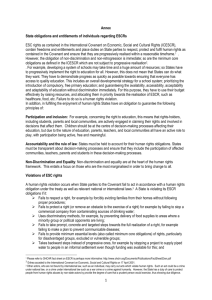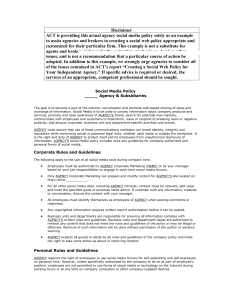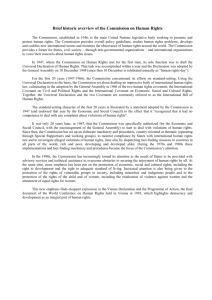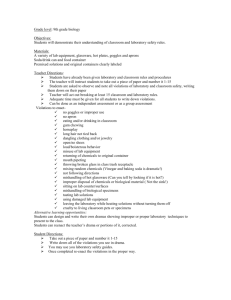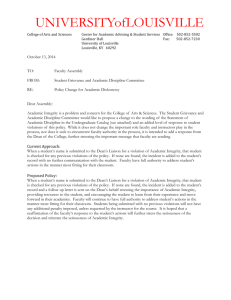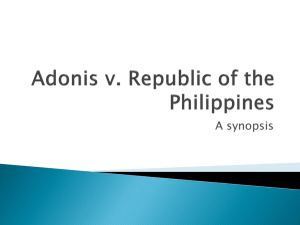THE MAASTRICHT GUIDELINES ON VIOLATIONS OF ECONOMIC
advertisement
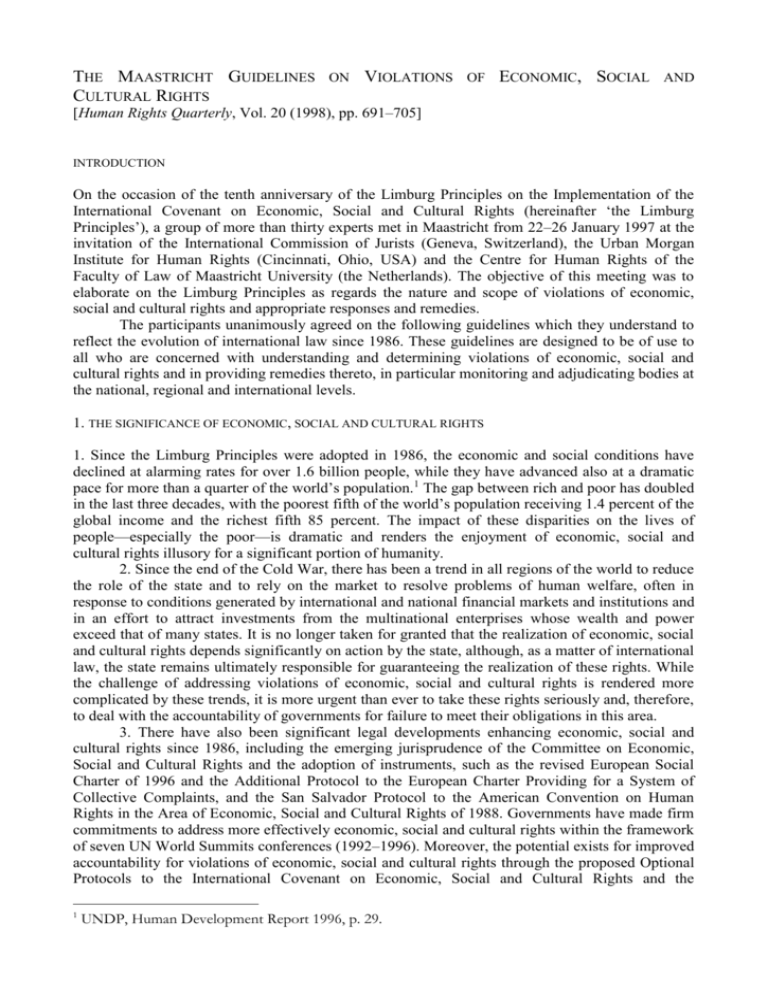
THE MAASTRICHT GUIDELINES CULTURAL RIGHTS ON VIOLATIONS OF ECONOMIC, SOCIAL AND [Human Rights Quarterly, Vol. 20 (1998), pp. 691–705] INTRODUCTION On the occasion of the tenth anniversary of the Limburg Principles on the Implementation of the International Covenant on Economic, Social and Cultural Rights (hereinafter ‘the Limburg Principles’), a group of more than thirty experts met in Maastricht from 22–26 January 1997 at the invitation of the International Commission of Jurists (Geneva, Switzerland), the Urban Morgan Institute for Human Rights (Cincinnati, Ohio, USA) and the Centre for Human Rights of the Faculty of Law of Maastricht University (the Netherlands). The objective of this meeting was to elaborate on the Limburg Principles as regards the nature and scope of violations of economic, social and cultural rights and appropriate responses and remedies. The participants unanimously agreed on the following guidelines which they understand to reflect the evolution of international law since 1986. These guidelines are designed to be of use to all who are concerned with understanding and determining violations of economic, social and cultural rights and in providing remedies thereto, in particular monitoring and adjudicating bodies at the national, regional and international levels. 1. THE SIGNIFICANCE OF ECONOMIC, SOCIAL AND CULTURAL RIGHTS 1. Since the Limburg Principles were adopted in 1986, the economic and social conditions have declined at alarming rates for over 1.6 billion people, while they have advanced also at a dramatic pace for more than a quarter of the world’s population.1 The gap between rich and poor has doubled in the last three decades, with the poorest fifth of the world’s population receiving 1.4 percent of the global income and the richest fifth 85 percent. The impact of these disparities on the lives of people—especially the poor—is dramatic and renders the enjoyment of economic, social and cultural rights illusory for a significant portion of humanity. 2. Since the end of the Cold War, there has been a trend in all regions of the world to reduce the role of the state and to rely on the market to resolve problems of human welfare, often in response to conditions generated by international and national financial markets and institutions and in an effort to attract investments from the multinational enterprises whose wealth and power exceed that of many states. It is no longer taken for granted that the realization of economic, social and cultural rights depends significantly on action by the state, although, as a matter of international law, the state remains ultimately responsible for guaranteeing the realization of these rights. While the challenge of addressing violations of economic, social and cultural rights is rendered more complicated by these trends, it is more urgent than ever to take these rights seriously and, therefore, to deal with the accountability of governments for failure to meet their obligations in this area. 3. There have also been significant legal developments enhancing economic, social and cultural rights since 1986, including the emerging jurisprudence of the Committee on Economic, Social and Cultural Rights and the adoption of instruments, such as the revised European Social Charter of 1996 and the Additional Protocol to the European Charter Providing for a System of Collective Complaints, and the San Salvador Protocol to the American Convention on Human Rights in the Area of Economic, Social and Cultural Rights of 1988. Governments have made firm commitments to address more effectively economic, social and cultural rights within the framework of seven UN World Summits conferences (1992–1996). Moreover, the potential exists for improved accountability for violations of economic, social and cultural rights through the proposed Optional Protocols to the International Covenant on Economic, Social and Cultural Rights and the 1 UNDP, Human Development Report 1996, p. 29. Convention on the Elimination of All Forms of Discrimination Against Women. Significant developments within national civil society movements and regional and international NGOs in the field of economic, social and cultural rights have taken place. 4. It is now undisputed that all human rights are indivisible, interdependent, interrelated and of equal importance for human dignity. Therefore, states are as responsible for violations of economic, social and cultural rights as they are for violations of civil and political rights. 5. As in the case of civil and political rights, the failure by a State Party to comply with a treaty obligation concerning economic, social and cultural rights is, under international law, a violation of that treaty. Building upon the Limburg Principles,2 the considerations below relate primarily to the International Covenant on Economic, Social and Cultural Rights (hereinafter ‘the Covenant’). They are equally relevant, however, to the interpretation and application of other norms of international and domestic law in the field of economic, social and cultural rights. II. THE MEANING OF VIOLATIONS OF ECONOMIC, SOCIAL AND CULTURAL RIGHTS Obligations to respect, protect and fulfil 6. Like civil and political rights, economic, social and cultural rights impose three different types of obligations on States: the obligations to respect, protect and fulfil. Failure to perform any one of these three obligations constitutes a violation of such rights. The obligation to respect requires States to refrain from interfering with the enjoyment of economic, social and cultural rights. Thus, the right to housing is violated if the State engages in arbitrary forced evictions. The obligation to protect requires States to prevent violations of such rights by third parties. Thus, the failure to ensure that private employers comply with basic labour standards may amount to a violation of the right to work or the right to just and favourable conditions of work. The obligation to fulfil requires 2 The relevant Limburg Principles are the following: 70. A failure by a State party to comply with an obligation contained in the Covenant is, under international law, a violation of the Covenant. 71. In determining what amounts to a failure to comply, it must be borne in mind that the Covenant affords to a State party a margin of discretion in selecting the means for carrying out its objects, and that factors beyond its reasonable control may adversely affects its capacity to implement particular rights. 72. A State party will be in violation of the Covenant, inter alia, if: – it fails to take a step which it is required to take by the Covenant; – it fails to remove promptly obstacles which it is under a duty to remove to permit the immediate fulfillment of a right; – it fails to implement without delay a right which it is required by the Covenant to provide immediately; – it wilfully fails to meet a generally accepted international minimum standard of achievement, which is within its powers to meet; – it applies a limitation to a right recognized in the Covenant other than in accordance with the Covenant; – it deliberately retards or halts the progressive realization of a right, unless it is acting within a limitation permitted by the Covenant or it does so due to a lack of available resources or force majeur; – it fails to submit reports as required under the Covenant. 73. In accordance with international law each State party to the Covenant has the right to express the view that another State party is not complying with its obligations under the Covenant and to bring this to the attention of that State party. Any dispute that may thus arise shall be settled in accordance with the relevant rules of international law relating to the peaceful settlement of disputes. The full text of the Limburg Principles was published in UN Doc. E/CN.4/1987/17, Annex. It was reprinted in 9 Hum. Rts. Q. 122–35 (1987) and 37 ICJ Rev., Dec. 1986, at 43, 43–55. States to take appropriate legislative, administrative, budgetary, judicial and other measures towards the full realization of such rights. Thus, the failure of States to provide essential primary health care to those in need may amount to a violation. Obligations of conduct and of result 7. The obligations to respect, protect and fulfil each contain elements of obligation of conduct and obligation of result. The obligation of conduct requires action reasonably calculated to realize the enjoyment of a particular right. In the case of the right to health, for example, the obligation of conduct could involve the adoption and implementation of a plan of action to reduce maternal mortality. The obligation of result requires States to achieve specific targets to satisfy a detailed substantive standard. With respect to the right to health, for example, the obligation of result requires the reduction of maternal mortality to levels agreed at the 1994 Cairo International Conference on Population and Development and the 1995 Beijing Fourth World Conference on Women. Margin of discretion 8. As in the case of civil and political rights, States enjoy a margin of discretion in selecting the means for implementing their respective obligations. State practice and the application of legal norms to concrete cases and situations by international treaty monitoring bodies as well as by domestic courts have contributed to the development of universal minimum standards and the common understanding of the scope, nature and limitation of economic, social and cultural rights. The fact that the full realization of most economic, social and cultural rights can only be achieved progressively, which in fact also applies to most civil and political rights, does not alter the nature of the legal obligation of States which requires that certain steps be taken immediately and others as soon as possible. Therefore, the burden is on the State to demonstrate that it is making measurable progress toward the full realization of the rights in question. The State cannot use the ‘progressive realization’ provisions in article 2 of the Covenant as a pretext for non-compliance. Nor can the State justify derogations or limitations of rights recognized in the Covenant because of different social, religious and cultural backgrounds. Minimum core obligations 9. Violations of the Covenant occur when a State fails to satisfy what the Committee on Economic, Social and Cultural Rights has referred to as ‘a minimum core obligation to ensure the satisfaction of, at the very least, minimum essential levels of each of the rights [. . .]. Thus, for example, a State party in which any significant number of individuals is deprived of essential foodstuffs, of essential primary health care, of basic shelter and housing, or of the most basic forms of education is, prima facie, violating the Covenant.’3 Such minimum core obligations apply irrespective of the availability of resources of the country concerned or any other factors and difficulties. Availability of resources 10. In many cases, compliance with such obligations may be undertaken by most States with relative ease, and without significant resource implications. In other cases, however, full realization of the rights may depend upon the availability of adequate financial and material resources. Nonetheless, as established by Limburg Principles 25–28, and confirmed by the developing jurisprudence of the Committee on Economic, Social and Cultural Rights, resource scarcity does 3 See Committee on Economic, Social and Cultural Rights, General Comment No. 3, 5th Sess., 1990, UN Doc. E/1991/23, Annex III, p. 10. not relieve States of certain minimum obligations in respect of the implementation of economic, social and cultural rights. State policies 11. A violation of economic, social and cultural rights occurs when a State pursues, by action or omission, a policy or practice which deliberately contravenes or ignores obligations of the Covenant, or fails to achieve the required standard of conduct or result. Furthermore, any discrimination on grounds of race, colour, sex, language, religion, political or other opinion, national or social origin, property, birth or other status with the purpose or effect of nullifying or impairing the equal enjoyment or exercise of economic, social and cultural rights constitutes a violation of the Covenant. Gender discrimination 12. Discrimination against women in relation to the rights recognized in the Covenant, is understood in light of the standard of equality for women under the Convention on the Elimination of All Forms of Discrimination Against Women. That standard requires the elimination of all forms of discrimination against women including gender discrimination arising out of social, cultural and other structural disadvantages. Inability to comply 13. In determining which actions or omissions amount to a violation of an economic, social or cultural right, it is important to distinguish the inability from the unwillingness of a State to comply with its treaty obligations. A State claiming that it is unable to carry out its obligation for reasons beyond its control has the burden of proving that this is the case. A temporary closure of an educational institution due to an earthquake, for instance, would be a circumstance beyond the control of the State, while the elimination of a social security scheme without an adequate replacement programme could be an example of unwillingness by the State to fulfil its obligations. Violations through acts of commission 14. Violations of economic, social and cultural rights can occur through the direct action of States or other entities insufficiently regulated by States. Examples of such violations include: (a) The formal removal or suspension of legislation necessary for the continued enjoyment of an economic, social and cultural right that is currently enjoyed; (b) The active denial of such rights to particular individuals or groups, whether through legislated or enforced discrimination; (c) The active support for measures adopted by third parties which are inconsistent with economic, social and cultural rights; (d) The adoption of legislation or policies which are manifestly incompatible with preexisting legal obligations relating to these rights, unless it is done with the purpose and effect of increasing equality and improving the realization of economic, social and cultural rights for the most vulnerable groups; (e) The adoption of any deliberately retrogressive measure that reduces the extent to which any such right is guaranteed; (f) The calculated obstruction of, or halt to, the progressive realization of a right protected by the Covenant, unless the State is acting within a limitation permitted by the Covenant or it does so due to a lack of available resources or force majeure; (g) The reduction or diversion of specific public expenditure, when such reduction or diversion results in the non-enjoyment of such rights and is not accompanied by adequate measures to ensure minimum subsistence rights for everyone. Violations through acts of omission 15. Violations of economic, social, cultural rights can also occur through the omission or failure of States to take necessary measures stemming from legal obligations. Examples of such violations include: (a) The failure to take appropriate steps as required under the Covenant; (b) The failure to reform or repeal legislation which is manifestly, inconsistent with an obligation of the Covenant; (c) The failure to enforce legislation or put into effect policies designed to implement provisions of the Covenant; (d) The failure to regulate activities of individuals or groups so as to prevent them from violating economic, social and cultural rights; (e) The failure to utilize the maximum of available resources towards the full realization of the Covenant; (f) The failure to monitor the realization of economic, social and cultural rights, including the development and application of criteria and indicators for assessing compliance; (g) The failure to remove promptly obstacles which it is under a duty to remove to permit the immediate fulfilment of a right guaranteed by the Covenant; (h) The failure to implement without delay a right which it is required by the Covenant to provide immediately; (i) The failure to meet a generally accepted international minimum standard of achievement, which is within its powers to meet; (j) The failure of a State to take into account its international legal obligations in the field of economic, social and cultural rights when entering into bilateral or multilateral agreements with other States, international organizations or multinational corporations. III. RESPONSIBILITY FOR VIOLATIONS State responsibility 16. The violations referred to in section II are in principle imputable to the State within whose jurisdiction they occur. As a consequence, the State responsible must establish mechanisms to correct such violations, including monitoring investigation, prosecution, and remedies for victims. Alien domination or occupation 17. Under circumstances of alien domination, deprivations of economic, social and cultural rights may be imputable to the conduct of the State exercising effective control over the territory in question. This is true under conditions of colonialism, other forms of alien domination and military occupation. The dominating or occupying power bears responsibility for violations of economic, social and cultural rights. There are also circumstances in which States acting in concert violate economic, social and cultural rights. Acts by non-state entities 18. The obligation to protect includes the State’s responsibility to ensure that private entities or individuals, including transnational corporations over which they exercise jurisdiction, do not deprive individuals of their economic, social and cultural rights. States are responsible for violations of economic, social and cultural rights that result from their failure to exercise due diligence in controlling the behaviour of such non-state actors. Acts by international organizations 19. The obligations of States to protect economic, social and cultural rights extend also to their participation in international organizations, where they act collectively. It is particularly important for States to use their influence to ensure that violations do not result from the programmes and policies of the organizations of which they are members. It is crucial for the elimination of violations of economic, social and cultural rights for international organizations, including international financial institutions, to correct their policies and practices so that they do not result in deprivation of economic, social and cultural rights. Member States of such organizations, individually or through the governing bodies, as well as the secretariat and nongovernmental organizations should encourage and generalize the trend of several such organizations to revise their policies and programmes to take into account issues of economic, social and cultural rights, especially when these policies and programmes are implemented in countries that lack the resources to resist the pressure brought by international institutions on their decision-making affecting economic, social and cultural rights. IV. VICTIMS OF VIOLATIONS Individuals and groups 20. As is the case with civil and political rights, both individuals and groups can be victims of violations of economic, social and cultural rights. Certain groups suffer disproportionate harm in this respect such as lower-income groups, women, indigenous and tribal peoples, occupied populations, asylum seekers, refugees and internally displaced persons, minorities, the elderly, children, landless peasants, persons with disabilities and the homeless. Criminal sanctions 21. Victims of violations of economic, social and cultural rights should not face criminal sanctions purely because of their status as victims, for example, through laws criminalizing persons for being homeless. Nor should anyone be penalized for claiming their economic, social and cultural rights. V. REMEDIES AND OTHER RESPONSES TO VIOLATIONS Access to remedies 22. Any person or group who is a victim of a violation of an economic, social or cultural right should have access to effective judicial or other appropriate remedies at both national and international levels. Adequate reparation 23. All victims of violations of economic, social and cultural rights are entitled to adequate reparation, which may take the form of restitution, compensation, rehabilitation and satisfaction or guarantees of non-repetition. No official sanctioning of violations 24. National judicial and other organs must ensure that any pronouncements they may make do not result in the official sanctioning of a violation of an international obligation of the State concerned. At a minimum, national judiciaries should consider the relevant provisions of international and regional human rights law as an interpretive aide in formulating any decisions relating to violations of economic, social and cultural rights. National institutions 25. Promotional and monitoring bodies such as national ombudsman institutions and human rights commissions, should address violations of economic, social and cultural rights as vigorously as they address violations of civil and political rights. Domestic application of international instruments 26. The direct incorporation or application of international instruments recognizing economic, social and cultural rights within the domestic legal order can significantly enhance the scope and effectiveness of remedial measures and should be encouraged in all cases. Impunity 27. States should develop effective measures to preclude the possibility of impunity of any violation of economic, social and cultural rights and to ensure that no person who may be responsible for violations of such rights has impunity from liability for their actions. Role of the legal professions 28. In order to achieve effective judicial and other remedies for victims of violations of economic, social and cultural rights, lawyers, judges, adjudicators, bar associations and the legal community generally should pay far greater attention to these violations in the exercise of their professions, as recommended by the International Commission of Jurists in the Bangalore Declaration and Plan of Action of 1995.4 Special rapporteurs 4 Bangalore Declaration and Plan of Action (1995), reprinted in 55 ICJ Rev., Dec. 1995, at 219, 219–27. 29. In order to further strengthen international mechanisms with respect to preventing, early warning, monitoring and redressing violations of economic, social and cultural rights, the UN Commission on Human Rights should appoint thematic Special Rapporteurs in this field. New standards 30. In order to further clarify the contents of States obligations to respect protect and fulfil economic, social and cultural rights, States and appropriate international bodies should actively pursue the adoption of new standards on specific economic, social and cultural rights, in particular the right to work, to food, to housing and to health. Optional protocols 31. The optional protocol providing for individual and group complaints in relation to the rights recognized in the Covenant should be adopted and ratified without delay. The proposed optional protocol to the Convention on the Elimination of All Forms of Discrimination Against Women should ensure that equal attention is paid to violations of economic, social and cultural rights. In addition, consideration should be given to the drafting of an optional complaints procedure under the Convention on the Rights of the Child. Documenting and monitoring 32. Documenting and monitoring violations of economic, social and cultural rights should be carried out by all relevant actors, including NGOs, national governments and international organizations. It is indispensable that the relevant international organizations provide the support necessary for the implementation of international instruments in this field. The mandate of the United Nations High Commissioner for Human Rights includes the promotion of economic, social and cultural rights and it is essential that effective steps be taken urgently and that adequate staff and financial resources be devoted to this objective. Specialized agencies and other international organizations working in the economic and social spheres should also place appropriate emphasis upon economic, social and cultural rights as rights and, where they do not already do so, should contribute to efforts to respond to violations of these rights.

